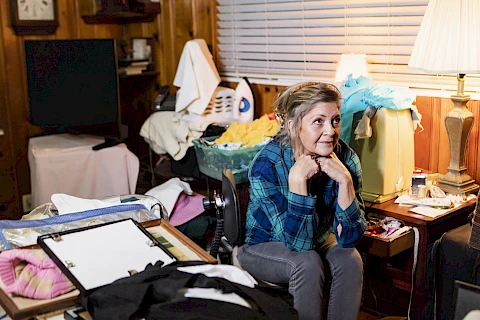
Hoarding is a behavior that affects many people, but it can be particularly dangerous for seniors. Hoarding involves the excessive collection of items and an inability to discard them. This issue is more common among older adults for various reasons, including emotional attachment to items and difficulties in organizing. Addressing hoarding behaviors is integral to ensuring the health and safety of seniors.
Increased Risk of Falls
One of the most immediate dangers of hoarding for seniors is the increased risk of falls. Cluttered spaces create numerous tripping hazards that can lead to serious injuries. Falls are already a leading cause of injury among seniors. One out of four seniors falls each year. These falls can result in broken bones, head injuries, and even hospitalization. Imagine a living room piled high with newspapers or walkways obstructed by stacks of books. The chances of tripping and falling become much higher in such environments, making it unsafe for seniors.
Fire Hazards
Hoarding can also significantly increase the risk of fires. When a home is packed with possessions, exits can become blocked, making it difficult to escape quickly in case of an emergency. The sheer volume of items can serve as a fuel source, making any fire more challenging to control. In a cluttered home, a small spark can quickly turn into a devastating blaze. Homes must have clear walkways and accessible exits. Simple actions, like installing smoke detectors and keeping flammable items away from heat, can help prevent fires.
Unsanitary Living Conditions
Another danger of hoarding is the creation of unsanitary living conditions. Clutter can lead to pest infestations, mold growth, and the accumulation of dust and dirt. These conditions pose serious health risks, such as respiratory problems, infections, and allergic reactions. Seniors must live in clean and sanitary environments to maintain their well-being. Keeping living spaces tidy and free of excessive clutter helps prevent these risks and improves overall health.
Social Isolation and Mental Health Issues
Hoarding doesn't just affect physical health; it can also cause social isolation and mental health problems. Seniors who hoard may feel ashamed or embarrassed about their living conditions, leading them to withdraw from social interactions. This isolation can result in loneliness and depression. Additionally, there is often a strong connection between hoarding and mental health disorders like anxiety and obsessive-compulsive disorder (OCD). Social interaction and mental well-being are necessary for seniors' quality of life. Encouraging open communication and seeking professional help can make a big difference.
Resources for Support
If you or a loved one is struggling with hoarding, various resources are available to provide support. In Michigan, you can find professional services like Senior Helpers. Our team can help manage hoarding behaviors and ensure a safer living environment. National organizations such as the Anxiety and Depression Association of America (ADAA) and the National Alliance on Mental Illness (NAMI) also offer valuable information and hotlines for assistance. Seeking support can make the process of addressing hoarding behaviors much more manageable.
Get Help With Managing Hoarding Behaviors From Senior Helpers Southeast Michigan
Hoarding poses numerous dangers for seniors, including increased risks of falls, fires, and unsanitary living conditions. Additionally, it can lead to social isolation and mental health issues. Address these behaviors promptly to ensure the safety and well-being of your older loved one. If you or someone you know lives in Farmington Hills, Nest Bloomfield, and Westland needs help in managing hoarding behaviors, don't hesitate to reach out for assistance. Contact us at Senior Helpers Southeast Michigan for expert support and care. By taking action, we can help our seniors live safer, healthier, and more fulfilling lives.